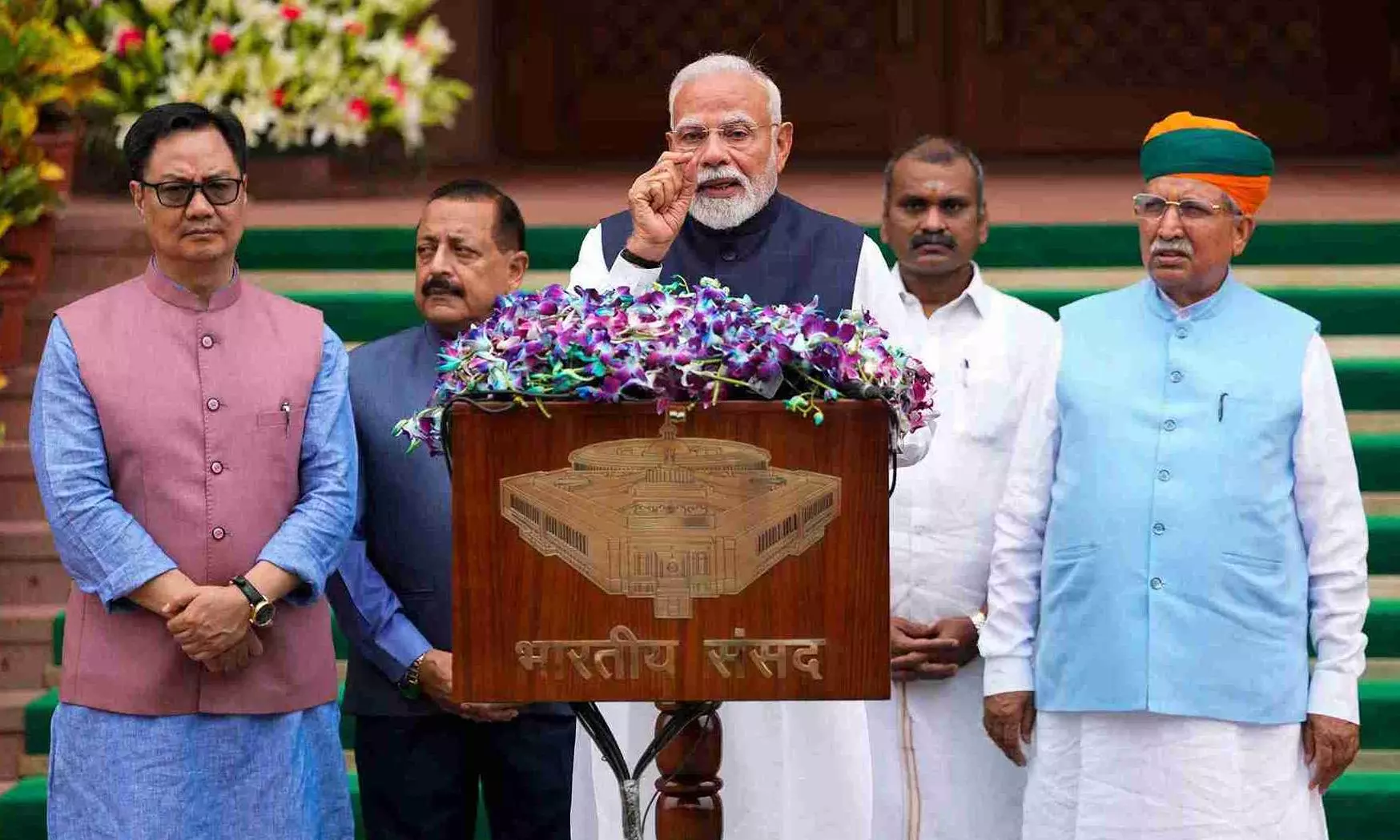
PM Modi's pre-session speech draws criticism on parliamentary accountability
PM Modi hails Op Sindoor triumph; will Oppn get answers? | Discussion
With both Houses adjourned repeatedly, will Parliament honestly debate Operation Sindoor? Has PM Modi’s speech already clipped the Opposition’s wings?

Senior journalist Anand Sahay and former Lok Sabha Secretary General PDT Achary join this episode of Capital Beat to weigh in on Prime Minister Narendra Modi’s lengthy statement on Operation Sindoor ahead of the Monsoon Session of Parliament. Moderated by The Federal, the discussion questions whether Modi’s speech preempted parliamentary accountability and whether the procedural tug-of-war between Rules 267 and 167 is obscuring substantive debate on national security.
PM’s speech questioned
The Monsoon Session began not with discussions inside the House, but with Prime Minister Modi's address outside Parliament. In a speech lasting over 14 minutes, uncharacteristically long for an opening session address, the PM declared Operation Sindoor a 100% success and dubbed it a “Vijay Utsav”, celebrating national unity and India’s diplomatic triumph in exposing Pakistan. However, this address stirred concern among constitutional observers.
Anand Sahay criticised the timing and location of the speech, suggesting it amounted to a “contempt of convention” if delivered after the House was in session. “In the Westminster system, government business must first be presented inside Parliament,” he said, arguing that addressing the media beforehand bypasses democratic norms.
He further emphasised that Modi’s speech appeared designed to set the narrative around Operation Sindoor even before discussions in the House could begin. “This is not a war. What is the celebration about?” asked Sahay, noting that even military officials had flagged limitations in engagement protocols during the operation.
Illusion of accountability?
Sahay painted a broader picture of what he views as the PM’s growing distance from institutional accountability. “There is a nervousness... He’s hoping against hope that this message will carry weight,” he said, condemning what he described as a culture of propaganda rather than transparent governance.
Referencing leaders like Nehru and Indira Gandhi, Sahay pointed out how former prime ministers ensured their presence in Parliament even during crises. “I’ve seen Indira Gandhi run to the Lok Sabha when Opposition leaders like Indrajit Gupta stood up to speak,” he said. In contrast, he alleged that Modi has “missed key sessions,” and that this was “unprecedented.”
According to Sahay, Modi’s speech likely “truncated” the scope for an honest discussion on Operation Sindoor. “By declaring 100% success outside, what room is left for the Opposition to ask hard questions about intelligence failure, about terrorist captures, about aircraft losses?”
Rules 267 vs 167: Misunderstanding or misuse?
The procedural standoff in the Rajya Sabha further complicated matters. The Opposition demanded a discussion under Rule 267, while the Treasury benches secured a discussion under Rule 167, a move admitted by Rajya Sabha Chairman Jagdeep Dhankhar.
PDT Achary clarified that Rule 267 is frequently misunderstood. “It is a provision to suspend a rule, not to allow discussion directly,” he said, citing examples where it could enable discussions on subjudice matters. “It’s not the equivalent of an adjournment motion. After suspension, a motion under another rule, like 167, must follow.”
He confirmed that 167 is the standard route for discussions on matters of public interest and allows voting and division, making it the more appropriate channel for parliamentary scrutiny. However, Achary did not comment on whether the Opposition was misusing 267, only noting that the rule has “rarely been used since 1950,” with the last instance being demonetisation.
Does voting matter?
Sahay noted that discussions under Rule 167 might allow voting, but whether either side seeks that accountability is debatable. “Will whips be issued? Will division be called? That’s unclear,” he said. “Most sessions now devolve into desk-thumping and heckling, with little actual debate.”
He acknowledged that the Opposition may be leveraging Rule 267 symbolically, “to make a point outside the House,” knowing that meaningful discussion inside is unlikely. “Even if the PM hadn’t spoken outside, I would still not expect an honest debate,” he added.
PM's speech unprecedented: Achary
In closing remarks, Achary strongly flayed the PM’s decision to make a policy-heavy speech to the media before Parliament convened. “It is unprecedented and unconstitutional,” he said. “Article 75 holds the Council of Ministers accountable to the House. The PM must speak inside the House, not outside, when Parliament is about to meet.”
Achary likened it to a finance minister leaking budget details to the press minutes before tabling them, a clear breach of protocol. “This has never happened in parliamentary history,” he stressed. “The PM is not addressing the media in a vacuum. He is responsible to the House, and such statements must be made within it.”
The content above has been generated using a fine-tuned AI model. To ensure accuracy, quality, and editorial integrity, we employ a Human-In-The-Loop (HITL) process. While AI assists in creating the initial draft, our experienced editorial team carefully reviews, edits, and refines the content before publication. At The Federal, we combine the efficiency of AI with the expertise of human editors to deliver reliable and insightful journalism.

